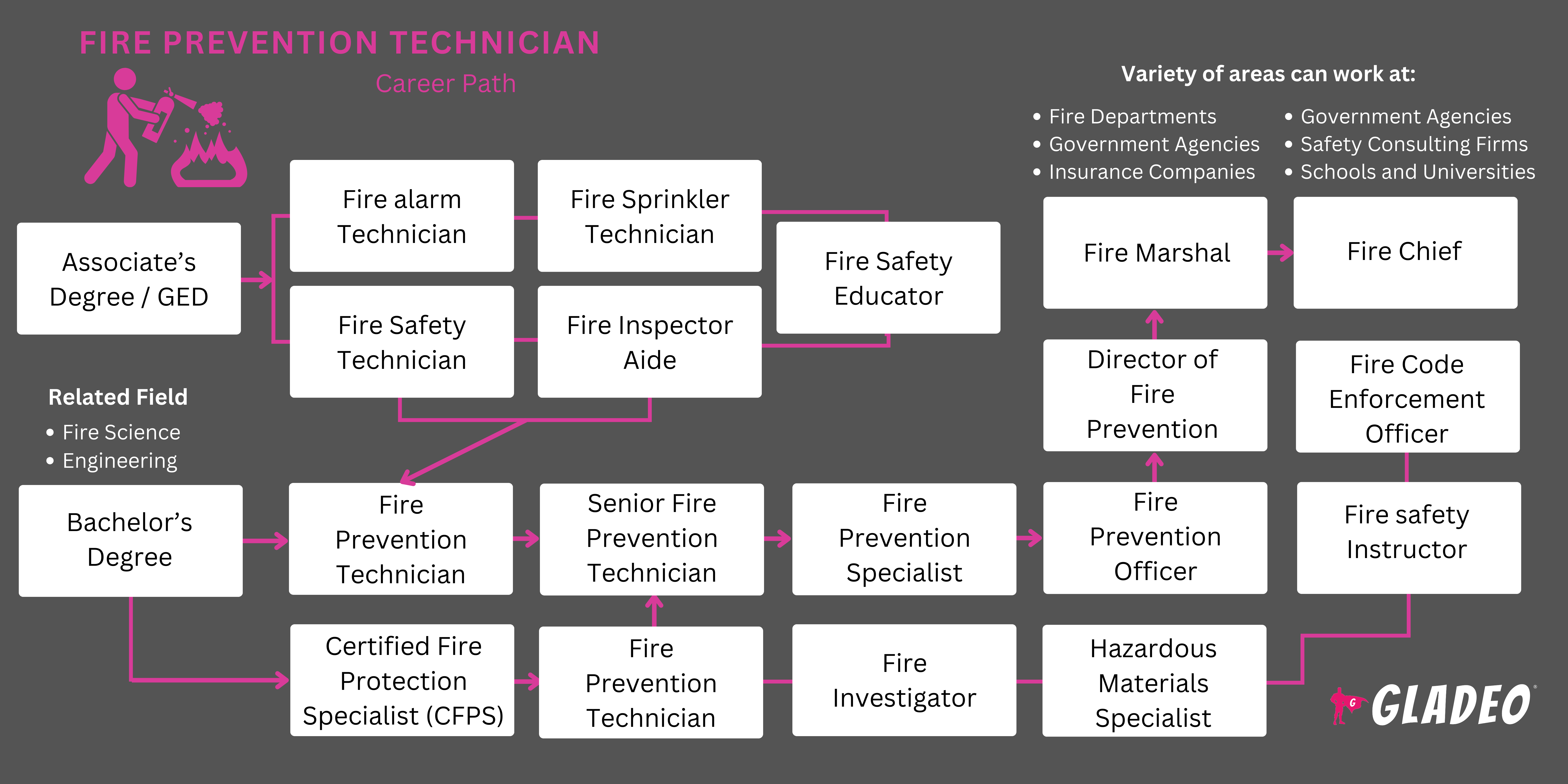聚光灯
Fire Inspector, Fire Safety Officer, Fire Marshal, Fire Protection Specialist, Fire Prevention Coordinator
If humans hadn’t figured out how to create and control fires, we’d still be living in the Stone Age. We would never have learned how to burn wood for heat and cooking. We also wouldn’t be able to burn coal to generate electricity or use fire to smelt metals.
But while fire is incredibly useful, it’s also one of the most destructive forces on Earth! It’s incredibly easy for unintentional fires to get started due to human negligence, overheated machinery, and faulty electrical wiring. That’s why many organizations utilize Fire Prevention Technicians to mitigate such potential hazards.
Unlike Fire Inspectors, technicians’ work is very hands-on. They typically focus on the technical aspects of fire prevention systems, including installation, maintenance, and repair of fire alarms, sprinklers, and fire safety-related electrical systems and mechanical components.
Note, there are also Fire Prevention Specialists who work with wildland firefighting crews.
- Helping to keep people and property safe from fires
- Potentially saving organizations from suffering serious losses
- Opportunities to work on a wide range of projects
工作日程
- Fire Prevention Technicians typically work full-time, with frequent travel and overtime possible.
典型职责
- Review existing fire prevention plans. Assess fire protection systems for compliance
- Advise on fire protection system design and installation
Install, test, and maintain fire alarms, sprinklers, and other fire suppression systems - Identify potential fire hazards in buildings and work environments
- Implement fire safety policies. Issue warnings and notices of correction
- Work with developers, architects, and engineers to ensure landscaping and vegetation are drought-tolerant or fire-resistant
- Conduct fire safety inspections and risk assessments of buildings
- Assess the fire resistance of building materials
- Take photos and use measuring devices and hydrocarbon analyzers, as needed
- Inspect fire extinguishers and other firefighting equipment
- Monitor fire detection and suppression system performance
- Consult on the storage and handling of flammable materials
- Prepare emergency evacuation plans. Train occupants on fire safety practices
- Organize fire drills and simulations
- Coordinate with local fire departments and emergency services
- Update fire safety documentation and records
额外责任
- File fire permits and plans
- Participate in fire safety meetings, workshops, and training programs
- Respond to public inquiries about fire safety codes and standards
- Support public fire education sessions
- Liaise with insurance companies regarding fire safety issues
- Help to investigate fire incidents to determine their causes
- Recommend improvements to enhance fire safety
- Evaluate new technologies and methods for fire prevention and protection
软技能
- 分析性的
- 以合规为导向
- 批判性思维
- 注重细节
- 独立性
- 倡议
- 诚信
- 观察技能
- 解决问题的能力
- 安全意识
- 健全的判断力
- 劲力
- 时间管理
技术技能
- Emergency response planning, including evacuation/emergency protocols
- Knowledge of fire alarms, sprinkler systems, and fire extinguishers
- Fire risk assessments of buildings and environments
- Knowledge of fire science, fire behavior, and preventative measures
- Hazardous materials handling and storage
- Investigation of fire incidents
- Local, state, and federal building codes and standards compliance
- Life Safety Code
- Report writing and documentation of inspections, compliance activities, investigations, etc.
- Understanding architectural plans, electrical diagrams, and fire protection system schematics
- 体能
- Basic first aid and CPR certification
- 建筑公司
- 教育机构
- Fire departments
- 政府机构
- Healthcare facilities
- Hospitality and entertainment venues
- Industrial facilities
- 保险公司
- Private fire safety consulting firms
- Real estate and property management companies
Fire Prevention Technicians have a responsibility to ensure buildings and surrounding areas are as safe as possible from fire risks. The job requires a deep understanding of fire safety regulations and fire protection systems, which entails keeping up with technological advancements and regulatory changes.
Technicians may work irregular hours, including nights and holidays, to perform inspections or respond to emergencies. The job can be physically demanding or involve navigating difficult environments and handling heavy equipment. There’s some personal risk when entering hazardous areas to conduct post-incident investigations.
Lastly, there’s always the possibility of witnessing the aftermath of devastating fires, which can be stressful. Despite the challenges, Fire Prevention Technicians take pride in protecting lives, property, and communities through their professional dedication and personal resilience!
There’s a growing trend to incorporate strategic fire prevention elements into architectural designs so that fires can be better contained and occupants can evacuate more safely. In addition, there’s a rise in the use of fire-resistant construction materials.
Fire prevention also increasingly relies on sophisticated computer models and simulations to predict how fires might start and spread in buildings. These advanced models assist in the development of more effective fire safety strategies and emergency response plans.
Meanwhile, smart technology such as smart detectors and alarms integrated with Internet of Things devices is helping to provide real-time monitoring, early warning, and remote diagnosis of potential fire hazards. These enhanced capabilities can save lives and property by sending notices to emergency services instantly when signs of smoke or fire are detected.
In their youth, Fire Prevention Technicians likely enjoyed practical, hands-on activities that required problem-solving and planning. They may have been keenly aware of safety issues and were perhaps always looking out for potential hazards and risks.
- Fire Prevention Technicians typically need an associate degree in fire science, public safety, or a related field as a starting point. Some technicians actually start out as firefighters
- Firefighters don’t need a college degree but must be 18 years old, have a high school diploma or GED, and must complete a fire academy program
○ Firefighter candidates must pass a background check and interview plus a general exam, the Candidate Physical Ability Test or BIDDLE test, and medical and psychological screenings
○ Fire academy programs take 12-14 weeks and cover topics such as “firefighting, fire-prevention techniques, local building codes, emergency medical procedures”
○ Per the U.S. Fire Administration’s Fire and Emergency Services Higher Education Project, students may get a head start by taking relevant community college or vocational training courses
○ Some departments require firefighter candidates to have EMT or paramedic certification
○ Once hired, firefighters may attend ongoing training at state and local agencies plus federal training sessions at the National Fire Academy
○ Wildland firefighters complete the Forest Service’s apprenticeship
- For Fire Prevention Technicians who don’t go the firefighter route first, they will need some relevant work experience. Many educational programs offer internships or co-ops, providing hands-on experience
- A bachelor’s can be beneficial but isn’t necessary unless focusing on the engineering aspects of fire prevention
- Employers may require a background check and a drug and alcohol screening
- A valid driver’s license is required for Fire Prevention Technicians to travel to work sites
- Continuous education is crucial to stay up-to-date on technology and regulations
- In addition to an associate degree, optional certifications can enhance your qualifications. Options include:
○ Certified Fire Alarm ITM Specialist for Facility Managers
○ Certified Fire Inspector I and II
○ Certified Fire Protection Specialist
○ Certified Sprinkler ITM Specialist for Facility Managers
○ Certified Water-Based Fire Protection System Inspection, Testing, and Maintenance
○ Certified Water-Based Systems Professional
- The National Association of Safety Professionals’ Fire Prevention Specialist 13-hour online course, which focuses on agents used in fire extinguishing systems, alarm and detection systems and components, exit routes, fire safety codes, medical services and first aid, OSHA’s Emergency Standards, and workplace fire safety
- Fire Prevention Technicians don’t require a four-year degree. Many community colleges offer suitable fire science programs.
- Some students apply to be firefighters first and go to a fire academy program.
- Consider the availability of financial aid and scholarships!
- 注意州内与州外的学杂费。
- 查看该专业有关毕业生就业率的统计数据。
- 看看他们是否与雇用毕业生的雇主有联系!
- Focus on courses in mathematics (such as algebra and geometry), chemistry, and science to topics to build a solid foundation for understanding fire dynamics and prevention strategies
- Note, math skills are useful for tasks such as:
○ Calculating the area of spaces to determine occupancy limits and egress requirements
○ Understanding fire suppression systems and alarms, which involves basic hydraulic calculations or electrical calculations for alarm circuits
○ Conducting risk assessments, which can involve statistical analysis of fire incident data to identify patterns or probabilities
- Volunteer with local fire departments or emergency services to gain firsthand experience
- Study books, articles, and video tutorials related to fire science, building codes, and fire prevention practices
- Determine a specific area of interest within fire prevention, such as inspection, code enforcement, or fire safety education, to tailor your educational pathway
- 保持简历的时效性,并在完成简历后添加相关经验、认证和教育成就
- 征求潜在职业推荐人的同意,提供他们的联系信息
- Network with experienced Fire Prevention Technicians to gain insights into the profession. If possible, shadow a technician at work for a day to see what the job entails
- Join professional organizations such as the National Fire Protection Association to connect with peers, learn from experts, and access resources
- Get your driver’s license and maintain a clean driving record
- Be prepared for a potential background check

- Complete your necessary education and try to get some work experience in a related position first, such as a fire safety apprenticeship
- 访问学校的就业中心,寻求帮助准备简历和进行模拟面试
- Make a profile on job portals such as Indeed, Glassdoor, Zippia, or USAJOBS
- 研究您所申请职位的雇主网站。了解他们的价值观和使命
- Screen job ads carefully. Note applicable keywords to use in your resume, such as:
- Code compliance
- Emergency response
- Fire alarm systems
- Fire prevention
- Fire safety
- Fire suppression systems
- Hazard analysis
- Incident investigation
- Inspection
- NFPA standards
- 风险评估
- Safety protocols
- Review Fire Prevention Technician resume templates for formatting ideas
- Reach out to working Fire Prevention Technicians to ask for job-seeking tips
- Study Fire Prevention Technician interview questions to see what you might be asked
- Dress appropriately for job interviews and practice doing mock interviews with friends
- Talk with your supervisor about professional development!
- Not all Fire Prevention Technicians hold a bachelor’s but at some point, it may help
- Sometimes extra courses or a certification can help you qualify for a raise or promotion
- 掌握法规、法律、标准或其他准则的相关变化的最新情况
- 研究相关设备、系统或软件的制造商和软件指南
- Keep learning new things from seasoned pros
- 自愿承担更多责任,包括监督职责
- 全面培训他人,为他们树立学习榜样
- 中小型组织的晋升机会可能有限。要想晋升,你可能必须在某个时候向更大的组织提出申请
- 积极参与与您的专业领域相关的专业组织和团体的活动
网站
- Automatic Fire Alarm Association
- 美国消防水喷淋管道协会
- 酒类、烟草、火器和爆炸物管理局
- Center for Public Safety Excellence
- 消防队安全官员协会
- FireScience.org
- Institution of Fire Engineers
- 国际纵火犯调查员协会
- 国际炸弹技术员和调查员协会
- 国际消防局长协会
- 国际规范委员会
- 全国火灾调查员协会
- 全国州级消防官兵协会
- 国家消防学院
- 国家防火协会
- 全国消防水喷淋管道协会
- Society of Fire Protection Engineers
- 美国消防局
- Women in Fire
书籍
- Fire Inspection and Code Enforcement, by International Fire Training Association
- Fire Inspector: Principles And Practice, by Jones & Bartlett Learning
- Fire Protection Systems, by A. Maurice Jones Jr.
- Life Safety Code, by NFPA
- Principles of Fire Prevention, by David Diamantes and A. Maurice Jones Jr.
Fire Prevention Technicians are crucial members of the organizations they work for, but if you want to explore other career options, check out the suggested job titles below!
- Arson Investigator
- 建设和建筑督察
- Emergency Medical Technician (EMT)
- Emergency Planner
- Fire Equipment Maintenance Technician
- 消防员
- 消防检查员
- Fire Safety Engineer
- 法证科学技术员
- Hazardous Materials (HazMat) Specialist
- 暖通空调技术员
- 警察或侦探
- 水管工
- 私人侦探
- Safety Compliance Officer
- 太阳能光伏安装人员
- Sprinkler System Installer
新闻联播

特色工作

在线课程和工具

年薪预期
New workers start around $156K. Median pay is $181K per year. Highly experienced workers can earn around $181K.





